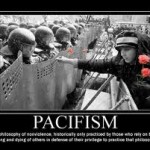The following is an excellent presentation of the case for non-resistance (not to be confused with certain forms of pacifism) from the pen of Dr. Finny Kuruvilla, a Harvard graduate. We will post the rest of this excerpt from his recent book King Jesus Claims his Church(-available on Amazon– reprinted by his kind permission) in a further post tomorrow.
Chapter 17
Peacemaking and nonresistance
Blessed are the peacemakers, for they shall be called sons of God. (Matthew 5:9)
The nations of this world employ physical weapons of offense and defense. When Jesus announced His new nation, He needed to clarify the character of His nation with respect to the use of force. Would the new nation be similar to Old Testament Israel? Would this new nation throw off Roman oppression with violence? In the Sermon on the Mount, Jesus devotes considerable time to the subject of how enemies should be treated (Matt. 5:38-48).
Instead of fighting against their enemies, Jesus’ followers are to love their enemies, bless them, and generously serve them. Peacemaking and loving one’s enemies are revolutionary concepts, difficult to overstate in importance. Jesus taught and modeled peacemaking and nonresistance, showing humanity a new way. As described in the Sermon on the Mount, the term nonresistance (from Matt. 5:39) encompasses the peaceful, non-retaliatory, and loving disposition toward a person’s enemies:
You have heard that it was said, “An eye for an eye and a tooth for a tooth.” But I tell you not to resist an evil person. But whoever slaps you on your right cheek, turn the other to him also. If anyone wants to sue you and take away your tunic, let him have your cloak also. And whoever compels you to go one mile, go with him two. Give to him who asks you, and from him who wants to borrow from you do not turn away. You have heard that it was said, “You shall love your neighbor and hate your enemy.” But I say to you, love your enemies, bless those who curse you, do good to those who hate you, and pray for those who spitefully use you and persecute you, that you may be sons of your Father in heaven; for He makes His sun rise on the evil and on the good, and sends rain on the just and on the unjust. For if you love those who love you, what reward have you? Do not even the tax collectors do the same? And if you greet your brethren only, what do you do more than others? Do not even the tax collectors do so? Therefore you shall be perfect, just as your Father in heaven is perfect. (Matt. 5:38-48)
Nonresistance should never be confused with cowardice or fleeing from danger. Jesus does not say that when slapped on one cheek, we are to run away. We are called to stand and actively offer the other cheek—a brave deed no doubt! When a disciple is sued for his tunic (inner shirt), he is not to cry, fall to the ground, or shrink away. Jesus asks His disciple to offer his cloak (outer coat), leaving him with effectively nothing. To walk with a person an extra mile is the very opposite of cowardice or fleeing from danger. These three examples involve a wrong to the body (slapping the cheek), wrong to one’s property (lawsuit for a tunic), and wrong to one’s liberty (being compelled to walk). Nonresistance is a bold, daring position. “Our Peacemaking Command is the command to be a Surprising Person.”
Jesus’ lengthy teaching on loving one’s enemies is preceded by the Beatitudes, which declare that those who are peacemakers will be called sons of God. Contrast the following groups of people:
• Peacebreakers: those who stir up controversy, dissension, and violence.
• Peacefakers: those who ignore the dissension, unrest, and violence in the world around them, selfishly choosing to attend to their own interests or respond with “an eye for an eye.”
• Peacemakers: those who identify unrest and strife, and respond with surprising nonresistance. Peacemakers sacrifice their own comfort by loving their enemy.
Outside the Sermon on the Mount, the doctrine of nonresistance is implied or affirmed in several locations:
Behold, I send you out as sheep in the midst of wolves. Therefore be wise as serpents and harmless as doves. (Matt. 10:16)
But Jesus said to him, “Put your sword in its place, for all who take the sword will perish by the sword.” (Matt. 26:52)
Repay no one evil for evil. Have regard for good things in the sight of all men. If it is possible, as much as depends on you, live peaceably with all men. Beloved, do not avenge yourselves, but rather give place to wrath; for it is written, “Vengeance is Mine, I will repay,” says the Lord. Therefore “If your enemy is hungry, feed him; If he is thirsty, give him a drink; For in so doing you will heap coals of fire on his head.” Do not be overcome by evil, but overcome evil with good. (Rom. 12:17-21)
For the weapons of our warfare are not of the flesh. (2 Cor. 10:4 ESV)
See that no one renders evil for evil to anyone, but always pursue what is good both for yourselves and for all. (1 Thess. 5:15)
For to this you were called, because Christ also suffered for us, leaving us an example, that you should follow His steps: “Who committed no sin, Nor was deceit found in His mouth”; who, when He was reviled, did not revile in return; when He suffered, He did not threaten, but committed Himself to Him who judges righteously. (1 Pet. 2:21-23)
He who kills with the sword must be killed with the sword. Here is the patience and the faith of the saints. (Rev. 13:10)
After the horrific loss of life through the wars of the twentieth century, much reflection has occurred on Jesus’ teachings in the Sermon on the Mount. George Zabelka, the Roman Catholic chaplain of the Hiroshima and Nagasaki World War II airmen, gave the following interview:
Q: You said the atomic bombing of Nagasaki happened to a Church that “had asked for it.” What do you mean by that?
Zabelka: For the first three centuries, the three centuries closest to Christ, the Church was a pacifist Church. With Constantine the church accepted the pagan Roman ethic of a just war and slowly began to involve its membership in mass slaughter, first for the state and later for the faith.
Catholics, Orthodox, and Protestants, whatever other differences they may have had on theological esoterica, all agreed that Jesus’ clear and unambiguous teaching on the rejection of violence and on love of enemies was not to be taken seriously. And so each of the major branches of Christianity by different theological methods modified our Lord’s teaching in these matters until all three were able to do what Jesus rejected, that is, take an eye for an eye, slaughter, maim, torture.
It seems a “sign” to me that seventeen hundred years of Christian terror and slaughter should arrive at August 9, 1945 when Catholics dropped the A-Bomb on top of the largest and first Catholic city in Japan. One would have thought that I, as a Catholic priest, would have spoken out against the atomic bombing of nuns. (Three orders of Catholic sisters were destroyed in Nagasaki that day.) One would have thought that I would have suggested that as a minimal standard of Catholic morality, Catholics shouldn’t bomb Catholic children. I didn’t.
I, like that Catholic pilot of the Nagasaki plane, was heir to a Christianity that had for seventeen hundred years engaged in revenge, murder, torture, the pursuit of power and prerogative and violence, all in the name of our Lord.
I walked through the ruins of Nagasaki right after the war and visited the place where once stood the Urakami Cathedral. I picked up a piece of a censer from the rubble. When I look at it today I pray God forgives us for how we have distorted Christ’s teaching and destroyed His world by the distortion of that teaching. I was the Catholic chaplain who was there when this grotesque process, which began with Constantine, reached its lowest point—so far.
Q: What do you mean by “so far”?
Zabelka: Briefly, what I mean is that I do not see that the moral climate in relation to war inside or outside the Church has dramatically changed much since 1945. The mainline Christian Churches still teach something that Christ never taught or even hinted at, namely the Just War Theory, a theory that to me has been completely discredited theologically, historically, and psychologically.
So as I see it, until the various churches within Christianity repent and begin to proclaim by word and deed what Jesus proclaimed in relation to violence and enemies, there is no hope for anything other than ever-escalating violence and destruction.
A Protestant commentator on the book of Matthew, after mentioning Timothy McVeigh’s training with the army (involving a chant of “Kill! Kill! Kill! Blood makes the grass grow!”), Christian-Muslim strife in Indonesia, and the Vietnam war, writes with remarkable humility and candor:
If these samples give the realities of war, can Christians conscientiously participate? The first three Christian centuries answered with a ringing ‘No.’ From the fourth-century Constantinian settlement to the present the overwhelming majority, including my own Reformation heritage, has answered with an almost equally unanimous ‘Yes.’ Matthew’s Gospel forces me to question this tradition. I am a new student of the pacifist position and, if I should adopt it, I do not yet know how to answer all the uncomfortable questions (such as, ‘Do we leave all the dirty work to others?’ ‘Do you just let a Hitler invade you?’). I intend to study the issue more thoroughly and to come to a more settled position. Our decisions on this issue are full of consequences. Jesus’ Political Commands (5:33-48) are as difficult as they are timely.
Nonresistance and peacemaking historically serve as the bright dividing line separating the peace churches from the state churches. The principles of faithful biblical interpretation (see chapter 8) give laser-like convergence to the position of nonresistance. The modern evangelical church errs in its general position that Christians should be peaceful in their personal lives, but are freed from this obligation insofar as they are employed by the state. Such a division between personal life and work life is alien to Scripture. In fact, the necessary inference is that disciples cannot serve in positions that involve the use of violence, such as police or military work. Notably, this passage on loving one’s enemies follows Jesus’ prohibition on oath-taking, which has been part of government service for millenia. Jesus’ prohibition of oaths thus practically prevents Christians from serving in government roles.
Besides Jesus’ direct teachings, a strong argument against Christian participation in war comes from the larger theme of Jesus’ founding a nation (see chapter 1). If Jesus’ founded a nation, then to join in the squabbles of other nations comes close to treason. In a very real sense, a Christian American is closer to a Christian Iraqi than he or she is to a pagan American. They are brother or sister in the Lord, an eternal bond. Should they kill one another?
Peacemaking and nonresistance are broader than refraining from physical violence. As noted above, this is an active, benevolent, comprehensive, and demanding position. Nonresistance touches virtually every area of life (body, property, and liberty, not to mention pride). Jesus gave examples of walking with a person an extra mile, or giving more than asked when sued. Paul offers the example of not engaging in lawsuits (1 Cor. 6:1-11). Jesus’ example of silence when reviled is an example of nonresistance in speech. While the focus of nonresistance and peacemaking is often toward war (for good reason), nonresistance touches virtually all aspects of life.
Answering Objections
What if someone breaks into your home—would you not harm the intruder?
A thoughtful and helpful response has been prepared elsewhere. Before answering the objection, a true story offers helpful perspective. Several years ago, Pablo Yoder and his family moved to Nicaragua, a nation known for its violence. On dozens of occasions the family has been robbed at gunpoint in their home. Women have even been molested. Yet they have chosen to respond with love to these assailants, including offering them food and drink—excellent examples of the active and surprising elements of nonresistance. Remarkably, their nonresistant behavior has broken the cycle of violence; most of these robbers have not returned, out of shame to harm such loving people. If the Yoder family chose to defend themselves with arms, they themselves might have been killed in a gunfight and their Christian testimony would have been lost.
Returning to the objection, its main flaw is that it poses a counterfactual. It depicts future circumstances as if one knew the outcome in advance. In reality, it is impossible to have this perfect foreknowledge. The situation is posed as an oversimplistic either/or: you shoot an assailant or he harms your family. However, this counterfactual quickly breaks down. A defender might shoot and miss, enraging the attacker, causing the invader to shoot and kill when he was not so intending. The counterfactual in fact is statistically misleading. In the United States, persons with guns in the home are twice as likely themselves to be killed as those without guns.
The question also covertly challenges one’s manhood. “Of course, you would protect your family wouldn’t you?” as if to say “no” would be to deny your masculinity and honor. Contrast the world’s shame in answering “no” to defending your home with arms to how Ezra found shame: “For I was ashamed to ask the king for a band of soldiers and horsemen to protect us against the enemy on our way, since we had told the king, ‘The hand of our God is for good on all who seek him, and the power of his wrath is against all who forsake him’ ” (Ezra 8:22).
What is the difference between nonresistance and pacifism?
Nonresistance is a term used by Christians who are following Jesus’ teachings. Nonresistance is practiced by those who hold to a “two kingdoms” doctrine, and they practice nonresistance because Jesus commanded it, not for political purposes. Nonresistance is also a broader term that encompasses not using violence in defending the home, not suing another person, and not verbally retaliating.
In contrast, pacifism is a term often used by non-Christians or by those who do not see themselves as citizens of another nation. They use pacifism as a political tool for changing the laws of an earthly nation. They will often stage rowdy protests against the government to accomplish their goals. Pacifists will use arms in defending their homes. Pacifism therefore is not biblical nonresistance. Because Christians are citizens of another nation, and their goals are different than those of the world, the term nonresistance is preferred.
Didn’t soldiers like Cornelius become Christians? Doesn’t that speak against nonresistance?
If this argument is valid, then prostitution and adultery are biblically sanctioned as well. Prostitutes and adulterers came to Jesus and were forgiven (see John 8:1-11). Though the Bible does not specifically follow their repentance and later lives, we can safely assume that they forsook their prior lifestyles. Similarly, with Cornelius, we can only assume that repentance and a change of occupation occurred. Indeed, the fact that New Testament authors go out of their way to describe those ostensibly furthest away from the kingdom—adulterers (John 8:1-11), cheaters (Luke 19:8), demon-possessed (Mark 5:15) and fortune-tellers (Acts 16:16)—delivered from bondage and turning to Jesus, makes it probable that the soldier’s story was chosen because his profession was so opposed to Jesus’ teaching.














